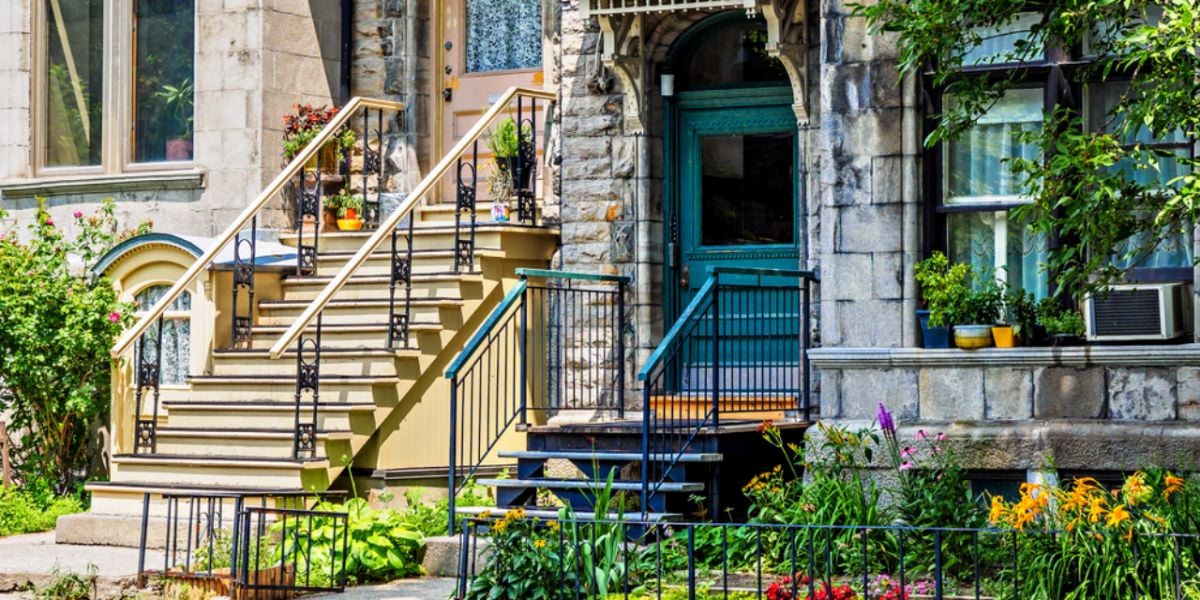
Are you preparing to relocate to Montreal? If so, the initial step is to secure a place to live. Here are some tips to assist you in your search.
Before moving to Montreal, learn about the different neighborhoods to avoid any surprises. You can find out more at one of the information sessions offered by the Ministry of Immigration. Montreal is one of the most popular destinations for immigrants, so you won't be the only one looking for a place to live when you arrive. In recent years, competition to settle in Montreal has become fierce. Rent prices have skyrocketed, and it's becoming less and less rare to queue up to view an apartment. Rest assured: if you look hard enough, you'll find what you're looking for.
Montreal has 19 boroughs, four metro lines, and over 200 bus routes. The Plateau Mont-Royal, Rosemont/Petite Patrie, Outremont, Westmount, Côte-des-Neiges/Notre-Dame-de-Grâce, Ville-Marie, Sud-Ouest, and Villeray-Saint-Michel-Parc-Extension districts make up the heart of the city.
The boroughs of Verdun, Ahuntsic-Cartierville, Mercier/Hochelaga-Maisonneuve, Montréal-Nord, Saint-Léonard, Saint-Laurent, Lachine and LaSalle border downtown, while L'île-Bizard-Sainte-Geneviève, Rivière-des-Prairies/Pointe-aux-Trembles and Pierrefonds-Roxboro are further away.
Good to know:
Montreal is home to some housing cooperatives, which offer less expensive housing on condition that you participate in the life of the cooperative. If you have housing maintenance skills and/or are willing to devote some time to participating in the upkeep of your building, you can apply directly on the co-op websites. For more information, visit Fechimm.coop or simply Google "Montreal housing cooperative".
Where and how to look for accommodation in Montreal
Note that you don't have to look for accommodation before you arrive on the island of Montreal. If you can afford it, you can rent a hotel room or an Airbnb for a few weeks and start looking once you're here. You can also opt for a temporary sublet while you look for a place to call home.
If you're new to Montreal and don't yet have a network, an Internet search is the best way to find long-term accommodation. You can also look in the classified ads of local newspapers or wander around looking for apartments or houses for sale or rent. You'll need to determine the type of accommodation you're looking for, whether it's a house, an apartment, or even a rental. Several websites can help you find the perfect property, including:
- geo.craigslist.org;
- Facebook (marketplace or concerned groups);
- padmapper.com;
- rentals.ca;
- kangalou.com;
- Logis Que bec;
- appartogo.com.
What you need to know before renting in Montreal
When looking for an accommodation to rent in Montreal, consider the price of the units, the number of floors, services and charges such as heating, electricity, water tax, Internet access, appliances, furniture and access to laundry facilities.
Bedbugs are a regular problem in Montreal, especially in summer. When you visit, ask the landlord about the latest treatments carried out and the preventive measures applied in the building.
Make sure that the neighborhood is easy to get to, with shops nearby and easy access to transportation. Parking is complicated downtown, so be sure to check this point if you have a car.
Finally, be careful if you're booking accommodation from abroad and are asked to pay a month in advance. Ads with this condition may be scams.
Vocabulary to know when renting in Montreal
When choosing a rental unit in Montreal, the first thing you need to know is the terms used:
- The terms "2½, 3½, 4½" correspond to the number of rooms the apartment you've chosen has. The "½" represents the bathroom;
- The term "semi-furnished" means that the apartment has at least a stove and a refrigerator;
- The terms "heated or unheated" and "Hydro included or not included" indicate whether the heating cost is covered in the lease. If it's not included, you'll have to coordinate with Hydro-Quebec to get it set up in your apartment, adding another bill to your list. Don't stress, though – registering with Hydro-Quebec is a straightforward process, and you can do it easily through their website.
Hydro-Qu e bec will also provide you with an estimate of the previous tenant's energy consumption and an annual payment plan. Please note that your housing budget, including rent, heating, electricity, insurance, and telephone, must not exceed 30% of your gross income.
The term "credit check" means that the landlord wishes to verify your creditworthiness. Landlords have the right to ask you for proof of employment or to carry out a credit check to verify that you can pay the rent each month or that you have no debts. They will need your name, address, and date of birth. If you're new to Quebec, your credit history will be zero. You'll first need to open a Quebec bank account and pay a few bills, such as telephone bills, so you may want to offer the contact details of your previous landlords or employer instead. Otherwise, with a little luck and perseverance, you'll find understanding landlords or landlords who are used to renting to newcomers.
Montreal real estate rental regulations
Important:
A landlord is not supposed to ask you for your social security number or keep a copy of your ID. The law also prohibits security deposits, but your future landlord may ask you for an advance on the first month's rent.
You can obtain information on your rights and obligations as a tenant from the Tribunal administratif du logement, formerly known as the Régie du logement. There, you can obtain forms such as the lease, lease assignment, and sublease contract.
Most Montreal landlords refuse to accept pets. Cats are better accepted than dogs, but they often need to be operated on and declawed. If you have a pet, make sure it's welcome even before you visit the property.
The lease in Montreal
A lease in Montreal is a written legal agreement between landlord and tenant. If you have a disagreement, this document can help you settle it. We recommend that you read the lease conditions carefully before signing. Make sure that the lease contract is drawn up in English or French, with the agreement of both parties, and that it mentions the date of possession, the duration of the lease, the amount of rent, and the services included in the price. In addition to rent, you may have to pay for electricity, Internet, hot water and heating.
Note that you must pay your rent on the first of each month, according to the amount indicated on the lease. If the landlord seeks to increase the rent, he must notify you at least 3 months before the lease expires. If you do not agree with the increase, you can seek advice from the Housing Tribunal. It's normal for rent to increase by a few dollars each year, but no more.
For your part, if you wish to leave your apartment at the end of your lease, you'll need to give your landlord between 3 and 6 months' notice. If you wish to leave your apartment early, ask your landlord if you can assign your lease or sublet the property. Assigning your lease relieves you of all liability, whereas subletting the apartment is riskier, as you will have to pay the rent if your subtenant refuses to do so.
Practical tips for renting a property in Montreal
Many rental leases expire on July 1st. However, it's possible to find an apartment at any time of year. It's a good idea to reserve your moving truck well in advance, as prices and availability may vary at different times of the year. July 1st is the busiest moving day.
If you're on your own, it may be more economical to live with a roommate. This practice, very common in Montreal, allows you to share the rent and bills (heating, for example) with all the tenants in the apartment.
Many rentals include access to a shared laundry room. If you're bringing your own equipment, check that the accommodation has suitable sockets.
Be careful with basement accommodation, as you'll be in serious need of light, especially when it snows. Make sure that access to public transport, supermarkets or stores is not difficult, especially in snowy weather. Finally, be sure to visit the premises and evaluate everything before agreeing to rent.
Where to furnish your Montreal apartment
If you need to buy furniture and appliances for your new apartment in Montreal, you'll be spoilt for choice. Major retailers such as Ikea, Brault & Martineau, and Surplus RD sell new equipment. There are also many used furniture and appliance stores, such as Salvation Army, Fripe-Prix Renaissance, and Village des valeurs. Finally, if you'd like to create a little original nest for yourself, designer boutiques can be found in vast numbers in Montreal.
Good to know:
As many Montrealers are moving on July 1st, there's a lot of used furniture on the street that day, but it's possible to make some very interesting finds 100% free of charge all year round. People don't hesitate to help themselves! However, before bringing home any furniture found on the street, make sure that it hasn't been contaminated by bedbugs.
Buying real estate in Montreal
The Montreal real estate market is competitive. You'll need to set a precise budget and be patient before you find the house or condo of your dreams. Start your search on the Internet, including sites such as publimaison.ca, centris.ca, and duproprio.com. Having a good credit history makes buying a home in Montreal much easier. Canadian banks will use it to determine whether or not to grant you a bank loan. If you don't yet have a credit history, you'll need to prove that you're in a good financial position to take out a loan in Quebec. In particular, you can provide a bank reference from your country of origin if you've been in Canada for less than 12 months.
To buy a house or apartment, we recommend that you contact a real estate agent or broker. You'll find many of them in the yellow pages of your telephone book or on the Internet. Before committing yourself, you should take into account annual property taxes, home insurance, registration fees, real estate agent or notary fees, taxes related to the purchase of a house, maintenance, and work costs, heating, electricity, hot water, and sewage. Running water is free throughout the country.
When you visit the property, don't hesitate to ask questions about safety. Remember to mention locking devices, smoke detectors, and emergency exits. You should also check that water fixtures are not damaged.
Good to know:
Starting January 1st, 2023, the Non-Canadian Residential Real Estate Prohibition Act restricts non-Canadians from buying residential real estate in Canada for a duration of 2 years. This prohibition applies to all purchase offers made after the Act takes effect.
Useful links:
We do our best to provide accurate and up to date information. However, if you have noticed any inaccuracies in this article, please let us know in the comments section below.








